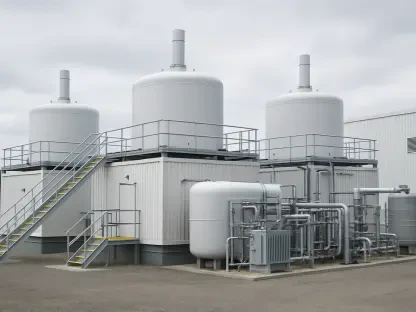In recent years, the demand for modular rooms in commercial spaces has surged, primarily due to their cost efficiencies and the rapid turnaround for lease agreements. Amid the evolving nature of hybrid workforces, building owners and tenants alike are seeking flexible and adaptive workspaces to meet their ever-changing needs. The flexibility offered by modular rooms equips businesses with the agility needed to manage space efficiently, responding swiftly to dynamic workforce requirements. This trend underscores the crucial role of technology in creating and sustaining such adaptable environments.
Central to this movement is the adoption of innovative technologies that enhance the functionality and flexibility of modular rooms. These advancements not only optimize space management but also drive comfort, efficiency, and productivity in workplace settings. As businesses pivot from conventional office arrangements to hybrid models, the importance of agile workspaces that seamlessly integrate cutting-edge technologies has become paramount. By leveraging the capabilities of dynamic room management software, IoT-enabled furniture, high-speed wireless connectivity, smart lighting, automated HVAC systems, and modular access control and surveillance systems, stakeholders can ensure optimal utilization and adaptability of commercial spaces.
Dynamic Room Management Software
Dynamic room management software stands out as a pivotal technology in enhancing the flexibility and operational efficiency of modular rooms. This sophisticated software comprehensively analyzes current room usage, providing invaluable data-driven recommendations to optimize space management. Offering a range of features, it includes scheduling and booking solutions that ensure seamless coordination of available spaces. These systems integrate effortlessly with other building systems, facilitating energy-saving automation through precise adjustments to lighting and HVAC based on room occupancy. Examples of such software, like Meta ControlRoom3D, RoomGPT, and RoomAI, illustrate the extensive capabilities and benefits that can be reaped.
The importance of dynamic room management software lies in its ability to transform physical spaces into intelligent environments that respond to occupant behaviors and preferences. This technology enables building owners and managers to monitor and adjust room conditions in real-time, enhancing both comfort and energy efficiency. By automating routine tasks such as lighting adjustments, temperature control, and room bookings, the software significantly reduces the need for manual oversight, freeing up resources to focus on strategic business initiatives. The seamless integration of dynamic room management software within modular spaces fosters an environment of enhanced productivity, sustainability, and adaptability, thus meeting the evolving requirements of modern workspaces.
IoT-enabled Furniture and Smart Lighting
The introduction of IoT-enabled furniture is another groundbreaking technology driving the rise of modular rooms. Embedded with smart technologies, this furniture can automatically adapt to new layouts, offering personalized settings for users regarding HVAC, lighting, and more. This adaptability ensures a high level of comfort and efficiency, which is particularly crucial in hybrid work environments where the configuration and usage of space can change frequently. By analyzing usage patterns and environmental conditions, IoT-enabled furniture can create optimal working conditions tailored to individual needs, thereby enhancing workplace productivity and well-being.
In parallel, smart lighting systems play a vital role in modern dynamic rooms, adjusting lighting levels automatically based on room configuration and usage. Through the integration of smart light fixtures and IoT sensors, these systems can detect occupancy and adapt lighting conditions accordingly, ensuring that energy is not wasted in unoccupied spaces. This not only enhances energy efficiency but also improves the overall ambiance and functionality of workspaces. By providing the right lighting conditions at the right times, smart lighting systems contribute to a conducive and comfortable working environment, thus augmenting the appeal of modular rooms.
Wi-Fi, 5G, and HVAC Automation
High-speed wireless connectivity, including Wi-Fi and 5G, is indispensable for the functionality and flexibility of modular rooms. These technologies eliminate the need for traditional network cabling, allowing easy and rapid reconfiguration of spaces without the complications of recabling. The availability of reliable, high-quality connectivity through Wi-Fi and private 5G networks ensures that occupants experience seamless communication and data transfer, akin to wired connections. This flexibility is critical in adapting to the changing needs of hybrid work environments, where quick and efficient changes to office layouts are often necessary.
HVAC automation further enhances the efficacy of modular rooms by providing precise control over heating and cooling zones based on occupancy or user preferences. Smart HVAC systems equipped with advanced controllers and occupancy sensors can adjust room temperatures in real-time, ensuring comfort while minimizing energy wastage in unoccupied rooms. This automation not only optimizes energy consumption but also enhances the comfort and satisfaction of room occupants. By maintaining optimal temperature conditions with minimal manual intervention, HVAC automation contributes significantly to the productivity and well-being of individuals in modular workspaces, creating a more attractive and efficient environment.
Modular Access Control and Surveillance Systems
Modular access control and surveillance systems are essential for maintaining security and monitoring in adaptable workspaces. These systems use advanced technologies such as biometric authentication, keyless entry solutions, and real-time monitoring to ensure that only authorized individuals can access sensitive areas. Integrated with other smart building systems, access control and surveillance solutions can quickly adapt to the changing layouts of modular rooms, providing scalable security that evolves with the workspace. Effective access control and surveillance are crucial for protecting assets, data, and personnel, thereby supporting a secure and flexible work environment.









